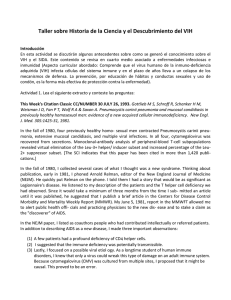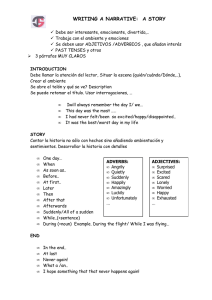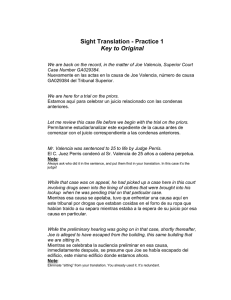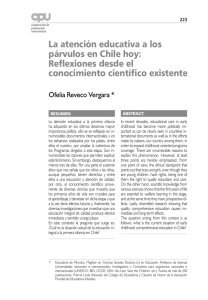Testigo de Elliott Abrams Green = noteworthy lines Mujer presidente
Anuncio
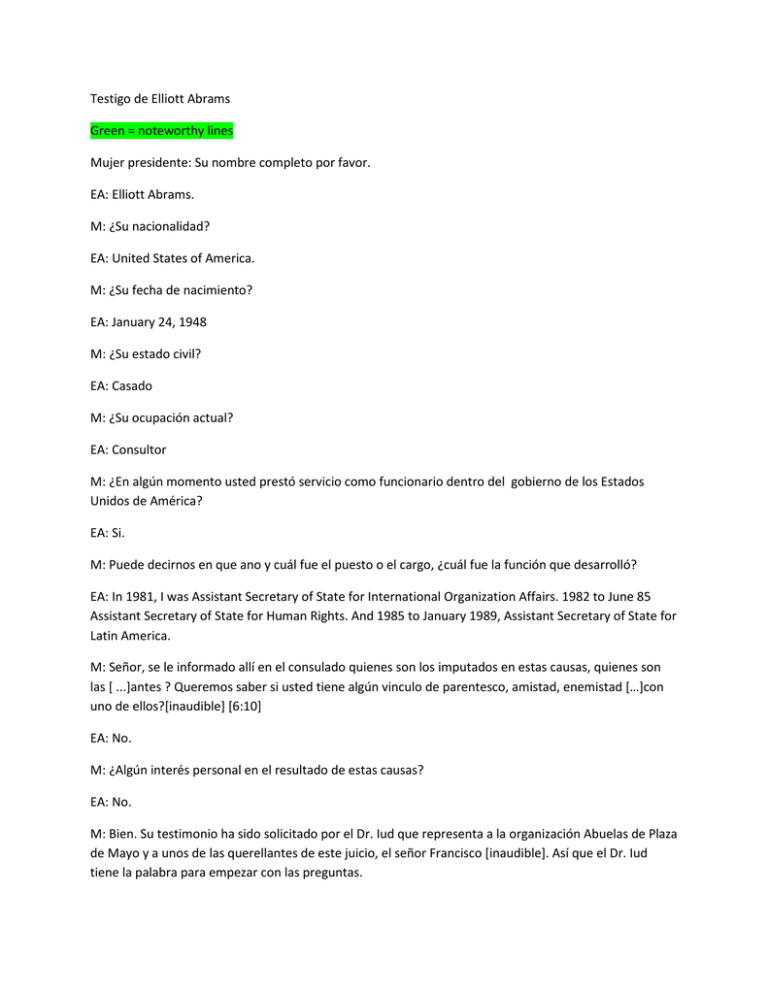
Testigo de Elliott Abrams Green = noteworthy lines Mujer presidente: Su nombre completo por favor. EA: Elliott Abrams. M: ¿Su nacionalidad? EA: United States of America. M: ¿Su fecha de nacimiento? EA: January 24, 1948 M: ¿Su estado civil? EA: Casado M: ¿Su ocupación actual? EA: Consultor M: ¿En algún momento usted prestó servicio como funcionario dentro del gobierno de los Estados Unidos de América? EA: Si. M: Puede decirnos en que ano y cuál fue el puesto o el cargo, ¿cuál fue la función que desarrolló? EA: In 1981, I was Assistant Secretary of State for International Organization Affairs. 1982 to June 85 Assistant Secretary of State for Human Rights. And 1985 to January 1989, Assistant Secretary of State for Latin America. M: Señor, se le informado allí en el consulado quienes son los imputados en estas causas, quienes son las [ ...]antes ? Queremos saber si usted tiene algún vinculo de parentesco, amistad, enemistad […]con uno de ellos?[inaudible] [6:10] EA: No. M: ¿Algún interés personal en el resultado de estas causas? EA: No. M: Bien. Su testimonio ha sido solicitado por el Dr. Iud que representa a la organización Abuelas de Plaza de Mayo y a unos de las querellantes de este juicio, el señor Francisco [inaudible]. Así que el Dr. Iud tiene la palabra para empezar con las preguntas. Dr. Iud: Gracias. Muy buenas días Señor Abrams. Usted recién nos informaba que entre los años 82 y 85 fue subsecretario de estado para derechos humanos en el departamento de estado. Puede informarnos quien lo asigno para ese cargo? EA: I was appointed by Secretary of State Alexander Haig. And President Reagan. I: Bien. ¿Requirió su [inaudible] una conformidad o acuerdo del senado de los Estados Unidos? EA: Yes, I was confirmed for this position in I believe December 1981. I: El titulo del cargo nos ha informado es subsecretario. Más allá de lo que indica el nombre, ¿puede indicarnos que jerarquía tenía dentro de la secretaria del estado? ¿Quién era su jefe, que lugar jerárquico ocupaba? EA: For most of the time that I was in this position, George Shultz was Secretary of State. Haig left in the summer of 1982. In this position I reported directly to Shultz. I: Puede describir brevemente que tareas realizaba en ese cargo, ¿cuál era la funciona de subsecretario para derechos humanos en la administración de Estados Unidos? EA: in the State Department there are geographic bureaus: Latin American, Europe, Africa. And functional bureaus handling a subject like economics or administration of the department, or in my case Human rights. The bureau covered the entire world. We paid a great deal of attention to Latin America. One task was to follow, to monitor, the human rights situation in each country. The regional bureau, the Latin American bureau, frequently tried to balance the many American interests: security interests, economic interests, commercial interest, human rights interests. But, in the human rights bureau we only had one focus: the human rights situations. One task was to keep the Secretary of State informed of the human rights situations. Another was to pressure foreign governments to improve the human rights situation. I: Bien. Recién nos indicaba que la oficina se empeñaba en relación a todo el mundo. Quiero preguntar en particular en relación a la República Argentina. ¿Conoce la situación que [inaudible] en la Argentina entre los años 76 y 83, con el orden constitucional de nuestro país? [12:42] EA: Yes, we tried to follow this situation. We had visitors from Argentina. From the human rights community who would inform us of what was going on. Of course, this is, in the 1980s, this is at a point when Latin America in general was moving from military dictatorships to a democracy. I remember, it is a long time, but I remember visits for example from Emilio Mignone and from Adolfo Esquivel in this period. I: ¿Conoce la situación que [inaudible] en la Argentina respecto a los desaparecidos? EA: En general, sí. I: Bien. Y, respecto a los hijos de las personas desaparecidas, que habían sido entre otras familias, ¿llegó información a [inaudible] sobre esa tema? [14:58] EA: We were aware of this problem. That is, we understood that some number of children had been taken from their families when their parents had been imprisoned or killed. And that these children had been given to other families. I: Dentro de su agenda en su oficina, ¿se trabajaba la cuestión vinculada a estos niños? ¿En la relación [inaudible] argentino? EA: We certainly discussed it with Argentine officials in Washington. We thought it was a very significant human rights problem. In one way, the most significant human rights problem, because these children were alive. This was an ongoing problem, not a problem with people who had been killed or punished in the past. [begins at 16:05] I: ¿Recuerda alguno de esos diálogos en particular, con que funcionarios argentinos fueron, puede relatarnos algo adicional de lo que se ha dicho sobre este tema? EA: I can’t remember any particular conversation, except there is a detailed memo that I wrote of a conversation with the Argentine Ambassador. [17:24] I: [Mumbling] [17:55] M: ¿Antes de que leas, señor, esta referencia que usted hace, con quien fue, en que año fue, y en qué lugar fue? EA: These meetings were with Ambassador Garcia del Solar, the Argentine ambassador in this period. I would meet with him probably every, I would say 2 or 3 months. Others in the State Department would also meet with him. The meetings would usually take place in the State Department or over lunch. M: Si ahora puede tomar vista del documento que le va a exhibir. EA: Yes, this is the document I was referring to. I: Le voy a hacer unas preguntas en relación a ese documento. ¿Usted lo quiere leer, o lo recuerda? EA: I read it again this morning I: Bien. En primer lugar, más allá del contenido del documento, ¿le quiero preguntar si era habitual que luego de las reuniones que usted mantenía por estos asuntos se redactara un memorándum como este? EA: No, typically after lunch with an Ambassador, I would not do a detailed memorandum. This was done because it was really a business meeting, not a social meeting. I: En casos de reuniones de trabajos, [inaudible] efectó un memorándum? [21:20] EA: Sometimes. Not always. And usually the memorandum would be done by a staff member. If the meeting was in my office there would be 2 or 3 other members of my staff. They would do the memo. The fact that I did this memo makes it clear to me that this was a lunch of only the two of us; no one else was present. I: En la primer hoja del memorándum, arriba de la inscripción, para hacerlo más sencillo voy a decirlo en ingles, donde dice “Memorandum of Conversation,” arriba hay una palabra tachada, parece que es “Confidential.” Justamente lo que solo quería preguntar es si este documento era confidencial, y en su caso, ¿por qué motivo? ¿Y qué significaba ese caracta? EA: This was a conversation with a foreign ambassador about sensitive matters. I was asking him to speak frankly. And obviously we were going to safeguard this information. Confidential means that, for example, we would not go to the press. It would go to Secretary Shultz and to the Bureau of Latin American Affairs. I: Sabe si este tipo de memorándum será archivado, reservados en el departamento de estado o mas allá, digamos del uso quisieran los funcionarios que lo recibían, que ustedes [inaudible] mencionar? [25:00] EA: Certainly. I: En el documento al inicio se indica que hubieran en la reunión dos, en castellano dice que habían dos temas principales: certificación y el tema de los desaparecidos. There were two main topics, certification and the question of the disappeared. Mi pregunta es si nos puede explicar brevemente, si usted recuerda, que es la referencia con el asunto de certificación. EA: I don’t remember it well. Uh, it, Congress demanded certifications of human rights progress. Um, for many, as a prerequisite to improving relations with many countries. The certification was not of a condition but of progress. And it was not only Argentina, Chile is mentioned here, but there were many other countries also. I: Luego, en la pagina dos, voy a leer la parte en castellano, hay un párrafo donde se indica “Los militares están absolutamente unidos y decididos a evitar un castigo amplio y vengativo por sus actos.” En ingles, esta “The military is absolutely united…” si? EA: Yes. I: Puede decirnos justamente algo más de lo que dice el documento, si usted recuerda de esta conversación o de otras conversaciones similares, en que se haya discutido el tema de la justicia por los hechos ocurridos en nuestro país en los anos de la dictadura, ¿la posición que tenia los representantes del gobierno argentino o en su caso cuales? EA: Well, first I would say, Ambassador Garcia del Solar was in a unique position. We did not view him as the ambassador of the military junta; we viewed him really as the ambassador of the next government, of a democratic Argentina. So, it’s striking that he is saying this, that the military is united. It was not surprising. I think it was, we would have said it was true of most of the military juntas in Latin America that when the end was near, their greatest concern was to avoid punishment. I: Recuerda si hubo alguna propuesta de parte su, sabe su gobierno, para, digamos, en relación con la certificación que explicó recién, revertir ese, esa tendencia de las juntas militares? EA: Well, the memo shows that we thought Argentina could be certified as making progress unless there were new incidents. I: Siguiendo al asunto de los niños hijos de desaparecidos por la cual le pregunté antes, en el memorándum usted relata que le preguntó al embajador por este asunto, bueno, y ahí tenemos también la respuesta del embajador [inaudible] ahí en el memorándum. Mi pregunta es si usted recuerda si volvieran a conversar sobre este asunto en alguna oportunidad, ¿o esta fue una respuesta definitiva del embajador y en estas reuniones que ustedes tenían cada dos, tres meses como dijo antes ya no fue reiterado? EA: I really cannot remember; it’s almost 30 years. It seems to me impossible that this was the last conversation about this problem. I: ¿Podría explicarnos brevemente porque le parece que sería imposible? EA: Well, this was a significant, continuing, ongoing human rights problem. Um, and as the memo says, the Ambassador agreed that it was. But, I cannot remember whether the follow up came between him and me or with the US ambassador in Buenos Aires or with the Bureau of Latin American Affairs, I just can’t remember. I: ¿Puede ser que otras agencias de su gobierno intervinieron en el asunto también? ¿Además del departamento del estado? EA: I doubt it. If the government of Argentina at some point asked for help in dealing with this...I suppose, conceivably, that the AID --the Agency of International Development—but, and they also were involved in human rights. That would be the only other logical possibility I think. I am treating the US embassy in Buenos Aires as part of the Department of State. I: Dentro de las reuniones que usted mantenía, las tareas habituales de su cargo, se incluya también la gestión o pedidos de [inaudible] en Argentina en relación a personas particulares, individuales identificadas con nombre y apellido, mas allá de si recuerde o no el nombre de esas personas [inaudible] pero ese tipo de gestión, se realizaba? EA: Well, primarily, we would ask about American citizens. We would probably mention Argentine citizens when a case had particular political significance. We might say, you know, if you put this man in jail or keep this man in jail the reaction in the United States will be very strong and we won’t be able to certify progress. That would be the kind of situation when we would mention an individual. That would be the kind of situation where we would mention a particular Argentine. I: ¿Y ese tipo de planteos, era usual que fueron hechos al embajador argentino en Washington? EA: I think we would, not often, but we thought of Ambassador Garcia del Solar as a democrat , as someone who wanted a democratic future of Argentina and who understood these problems. The problem was he was part of the Ministry of Foreign Affairs. And the Ministry of Foreign Affairs doesn’t put people in jail and doesn’t torture them, anywhere. In any country. So, sometimes we would try to work through the US ambassador in Buenos Aires because he could speak directly to people in the security organization, with the military or the police. I: ¿Y recuerda alguna otra interlocutor que tuviera dentro del gobierno argentino? EA: I really don’t. I: Finalmente Señor Abrams, quiero volver sobre la cuestión de los niños. El memorándum contiene, bueno, obviamente dice lo que usted puede leer y escribió. Mi pregunta es si puede brindarnos alguna información adicional a lo que dice allí sobre la propuesta que usted, según dice allí, habría hecho en esa reunión. Si la recuerda, si puede darnos en que consistía… EA: We were aware of this situation. And we knew that we were not talking here, or we believed, we were not talking about 1 or 2 children. Or one or two officers who had taken children. We thought there was a pattern or a plan. Because a lot of people were being jailed or killed. And it seemed to us that the military government had decided that at least some of the children of those people would be given to other families. So, this was a human rights problem, but it was also a matter of public policy for Argentina. A new government was going to have to figure out what to do. [begins at 40:30] I: Han pasado muchos años pero si usted recuerda, nos podría indicar cuáles eran las fuentes que tenían habitualmente de información para [inaudible] a este tipo de planteo, como el que acaba de hacer. [42:30] EA: Well, we got cables from the US Embassy in Buenos Aires, confidential cables. We had press, human rights groups, in Argentina and throughout the world, human rights groups in the US, we did meet with Argentine opposition figures, by which I mean opposition to the military junta. So we collected all of this information. I: ¿Recuerda haber recibido del gobierno argentino algún información en contrario de esta conclusión que usted acaba de brindar, de la evaluación que hacían que no se trataba de uno o dos casos sino que era algo más numeroso? ¿Que el gobierno argentino tratara de desmentir eso? EA: I do not remember any communication from the government, the junta, on this question. I: Y sobre los desaparecidos en general, ¿recuerda si el planteo del gobierno argentino era negar su existencia, o no brindar información, o algún otro tipo de política, digamos, había un reconocimiento de la existencia de los desaparecidos, de que habían desaparecidos en Argentina? EA: We had some information about people who were in prison, who were alive and in prison. Sometimes the government would confirm that they were in prison. This was important because then they couldn’t kill them. On the general question of disappeared persons, my memory is that they would simply say this was a war against communism and that the United States should be on their side. I: Bien, por el momento nada más, gracias. 2nd interviewer: Buenas tardes. ¿Le quería preguntar si usted recuerda quien era la persona que lo antecedió en el cargo? EA: In the Reagan administration, no one. There was someone in the Carter administration. 2: ¿Recuerda el nombre de esa persona? EA: Pat Derian. 2: ¿Tuvo oportunidad hablar con ella en algún momento? EA: In this period, no. 2: ¿Y sabe por otro medio cual era su labor? EA: What do you mean by “su labor?” 2: Su trabajo, sus tareas. EA: Well, I think essentially the same functions that I had. We had a different style of work, but the responsibilities were the same. 2: ¿Sabe cuál es el organismo en Estados Unidos que custodia los documentos clasificados? EA: I believe that every department maintains its own classified documents. The National Archive maintains them for the White House, but each department of government has its own. 2: ¿Tomo conocimiento que se hayan desclasificado documentos relativos a América Latina? EA: Yes, it’s a regular process. 2: No más preguntas, gracias. 3rd interviewer: Que tal, buenos días. Señor Abrams, [inaudible] expreso que algunos casos solicitaban información por determinados adultos detenidos y [inaudible] esas personas eventualmente fuesen asesinadas. En algún caso, [inaudible] recuerda, se pidió información o se le mencionó … en argentino … estaban en conocimiento puntual de niños y la situación…de ser separadas de sus familias [Translator: “He is talking about the adults, you know, you said you were aware of the fact, but did you at any time, were you aware of all these children who were at risk of being kidnapped?”] EA: My impression is that, well I took this job in December 1981. My impression was that these acts had taken place in the past. They were not ongoing. So, we were now discussing the future fate of the children, not kidnapping that was underway. 3: Exacto. Tiene razón que los hechos sucedieron con anterioridad, pero se seguían, digamos, desarrollando cuando él asumió este cargo. Se hizo alguna gestión ante el gobierno argentino por los niños que ya habían [inaudible]? ¿Alguna gestión concreto? [Translator: “Was there any concrete act that you required of the government of Argentina regarding these children? Something specific that you did?”] [51:20] EA: No, I think we, as this memo suggests, what we did was tell them in our view this is a terrible human rights problem. And very complicated. And Argentina, the new government of Argentina, would have to have some plan. And the adoption of such a plan would reflect very positively on Argentina. But as the memo shows, we did not have a solution to this problem. We mentioned, I mentioned, maybe the Church could help, but that was just one suggestion. 3: Bien. Por el momento no tengo más preguntas, gracias. Mi colega continuará con el interrogatorio. 4th interviewer: Usted nos comentó antes de las conclusiones que había sacado el departamento. Quería preguntarle si esas conclusiones, si sabe lo que consta, si esas conclusiones fueron conocidas por el gobierno argentino. EA: Yes, in general, we had to make these certifications so we had to explain to the Congress and to the government of Argentina why we reached the conclusions that we reached and we had to defend them. 4: Bien. Justamente quería preguntarle sobre la situación en torno a esta certificación. Lo llevaría el documento, que el señor tiene ya vista, En …. 81, la pregunta sería en torno a como veían para la época de esta entrevista de que ……la situación en Argentina, o si veían progresos…hacia esa certificación. Párrafo segundo, comienza con “I responded that” EA: Well, Argentina was clearly moving toward a democratic government, we thought. So in that sense, there was progress. But, it was not a democracy. Argentina was still a dictatorship. And what I was saying in this conversation with the Ambassador was that we could certify progress unless some event happened that made that ridiculous, politically impossible. 4: Cuando el señor habla de que veía progresos en ese camino a la democracia, en la [inaudible] De que conversó, quería preguntarle, ¿cuáles eran esos síntomas de progreso concretos que le permitieron asentar esa opinión? EA: I cannot remember the fact, this memo is December 3, 1982. I cannot remember what events in November or October or September we thought were positive, except the general sense that Argentina was moving towards free elections. 4: Antes, a preguntas de la guerrilla, sobre qué información habían considerado para llegar a conclusiones sobre la cantidad de casos en que la situación de los niños se verificaba, [inaudible]. Lo que le pregunto es si pudo, por algún medio, cualquiera sea, acceder a información sobre otro posible pluralidad de casos en donde los niños no fueron sustraídos o fueron devueltos a su familia, a los efectos de considerarla en su conclusión. [1:00:00] EA: Well, I don’t think we believed that in every single case of a disappeared person the children had been taken. We did not believe that there had been in every case. We believed it had happened in some cases and not just one or two. But in a certain sense it didn’t matter if it happened in a third of the cases or two-thirds of the cases, it was a significant human rights situation. I cannot remember numbers, that is I cannot remember how many children we thought were involved here. 4: Bueno, por el momento no tengo más preguntas, gracias. 5th interviewer: Señor Abrams, puede indicarnos cuál es su formación universitaria? EA: Yes, I have an undergraduate degree from Harvard, a law degree from Harvard, and a degree in International Relations from the London School of Economics. 5: Bien. Y al principio de su declaración dijo que se [inaudible] como consultora, actualmente. Mi pregunta es consultora en que asuntos, relacionados a estos [inaudible] formación, o en otras temas, consultora en que temas? EA: My current position is a senior fellow for Middle Eastern studies in the Council on Foreign Relations. I was in charge of Middle Eastern affairs in the White House under President Bush, and that is the area that I have been working on for the last 10 years, the Middle East, not Latin America. What I do with the Council really is write about events in the Middle East, analysis in the Middle East. 5: Y de acuerdo a su experiencia en el cargo que tenía en aquel momento, y también su formación profesional y su empeño actual, este dialogo que usted tuvo con García del Solar, en qué nivel de gestión diplomática lo ubicaría, las relaciones internacionales, como una gestión de alto nivel , de menor nivel, que nivel le otorga esta gestión? EA: This was an important conversation. The fact that we were doing it alone is significant. The purpose was to be able to speak more frankly than we would in front of staff members. The fact that I would write a lengthy memo myself was another indication that it was an important conversation. 5: Bien. Los temas que así se trataron, mas allá insisto del tiempo que ha pasado, de acuerdo a su recuerdo y su experiencia, ¿eran definidos por usted autónomamente, o eran conversados con el secretario de estado, su jefe, con el presidente? ¿Cómo se definían, digamos, los asuntos de la reunión? EA: I think, well, I don’t know in this case. Normally, we would have a staff meeting every morning with the Secretary. And I might tell him I was going to be meeting with the Argentine Ambassador, we might discuss it, or I might tell him the next day what had happened. So I would get some kind of, possibly might get some kind of direction from him, but I don’t remember in this case. 5: Bien. Finalmente, durante su desempeño en esos años, del 82 a 85, como subsecretario del estado para derechos humanos, nos ya ha dicho que su trabajo se relacionaba con todo el mundo. ¿Conoció otros casos análogos al argentino en cuanto a los niños hijos de desaparecidos de otros países? EA: No, obviously there were lots of military juntas in Latin America and lots of other military dictatorships in Asia too. I don’t remember a similar case involving children being taken from their families, this was the worst. 5: Nada más, muchas gracias Señor Abrams. M: Quería yo [inaudible] a algunas preguntas que se le han hecho y algo que usted ha dicho a ver si podemos tener alguna referencia con respecto a que usted, al tomar conocimiento de que varios niños fueron sustraídos, lo que quiero saber es ¿si tomó conocimiento o al menos pudo elaborar alguna hipótesis de por qué motivo esos niños eran sustraídos de sus padres o del ámbito familiar y no habrían sido entregados a sus familias? EA: Yes, as I remember it there were two factors that we thought were important. One was that the families of the disappeared person were viewed by the military as not fit to raise these children because these were disloyal or communist families. The second factor was, in some cases anyway, that the families to which they were given had no children. They were unable to have children, so this would be a great blessing for them. This was a great blessing for these loyal families. [begins at 1:10:13] M: Esto es una hipótesis o un análisis que hizo usted o tuvo elementos que acreditan, que pueda dar este concretamente, estas dos, esta es porque se llegó a esto, si habría llegado a esto, ¿es un análisis suyo o tiene elementos a través de alguien o por algún medio? EA: It was not a personal analysis that I made. It was an analysis that we had in the US government. What I can’t remember is what was the basis, what information was the basis for that conclusion. I know we thought that but I cannot remember what sources of information led us to this conclusion. M: Bien. Hasta que usted estuvo desempeñándose en ese cargo, y de este cable, de esta conversación que tenia con el embajador argentino, ¿de aquí surge que el embajador habría trasmitido o iba a trasmitir la en [inaudible] de su gobierno, sus administraciones exteriores [inaudible] la presidencia de la nación argentina en ese momento [inaudible] Estos fueron palabras del embajador argentino allí en Washington? [1:14] EA: Yes, Yes, it is in the memo that he says [flipping through memo] I take it back, he says that he had already made some of these points to the President and the Foreign Minister. He said he had already made this point to his Foreign Minister and President. And he said he would raise this point once more with his capital. M: Después de esta reunión, usted dijo que no recuerda pero voy a insistir a ver si pueda recordar, si por parte del gobierno argentino, con respecto a este tema, de los niños, hubo algún tipo de propuesta o acercó a los Estados Unidos alguna idea o alguna propuesta sobre específicamente el tema de la apropiación de estos niños? EA: I really don’t remember. There may be other documents. But this would be something we would be involved in only until there was a democratic government. Because then we would think, look, this is an Argentine problem. You have an elected government, you… M: Usted solamente…quería saber si usted pudo….usted vino a Buenos Aires en algún momento durante el gobierno militar? EA: No. M: ¿Y tuvo algún contacto o alguna reunión con quien era el canciller, que era el ministro de relaciones exteriores argentino? EA: Not in this period. Later, in the democratic government. But the Assistant Secretary for Latin America would have had those contacts, not me. In many cases foreign officials would not meet with the Assistant Secretary for Human Rights. 4: Simplemente para preguntarle cual era la relación entre los Estados Unidos y las fuerzas armadas argentinas en la época, sobre todo con consideración la guerra de las Malvinas. EA: The relations between the US and the military government were difficult. Clearly the US had given great assistance to the British. So, there is even some mention of this in the memo by Ambassador Garcia del Solar. Particularly the fact that the younger military officers really had a very bad opinion of the United States. Really, you know, our goal was to have a good enough relationship with them to get them to step aside. 6th interviewer: Buenas tardes señor. Esta certificación de la cual usted habla en su memorándum, ¿qué efecto concreto tenia? En caso que se produjera o de no producirse en relación a Argentina, ¿Qué significaba concretamente certificar o no certificar? EA: There are two questions: practical and political. Practically, the failure to certify would mean for example no foreign aid, economic assistance, which we may not have been giving to Argentina anyway at that time after the war. There were other questions too for example, in some cases, if we could not certify we would have to vote against a loan for that country by the World Bank or the Inter-American Development Bank. And then there was the political question: failure to certify was a condemnation. It was saying that there was no human rights progress. 6: La Republica Argentina, con motivo de su política de derechos humanos, con anterioridad de la guerra, ¿había sufrido alguna sanción por parte de los Estados Unidos, en materia económica? EA: I really don’t remember. I don’t remember when the certification requirement was put in place. And when the Carter or Reagan Administration did or did not certify it. This would have been something Congress did requiring the certification, but I don’t remember when. 6: ¿Pero sabe concretamente si con anterioridad de la guerra hubo algún tipo de sanción contra Argentina? Más allá de esto que explica la certificación, ¿si concretamente Argentina tuvo algún tipo de sanción por parte de su gobierno? EA: I don’t remember. 6: No tengo más preguntas, gracias señor. M: ¿No hay más preguntas? Bien. Bien, Señor Abrams, habríamos concluido su declaración. No sé si usted quiere agregar algo más que no le hayamos preguntado y que haga el objeto de este juicio por lo cual estamos aquí reunidos. EA: No, I have nothing to add, thank you. M: Bueno, gracias a usted por su declaración.

